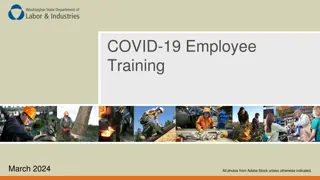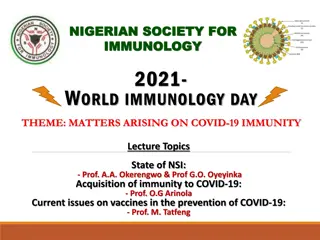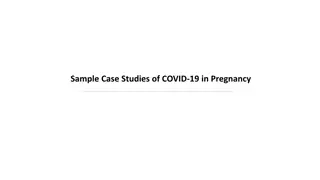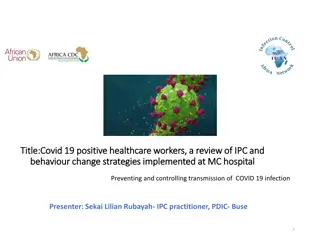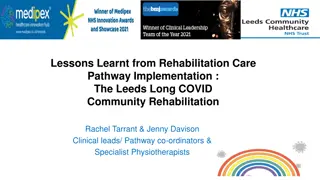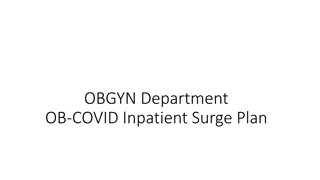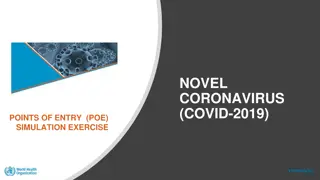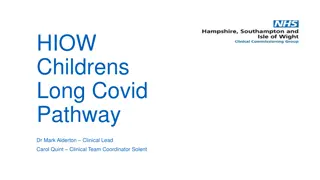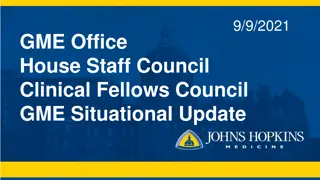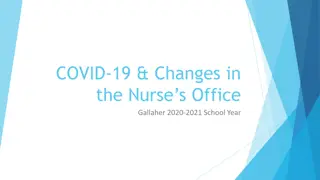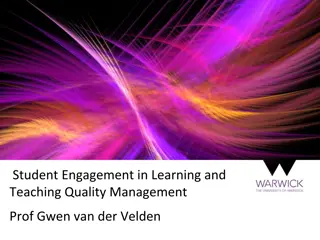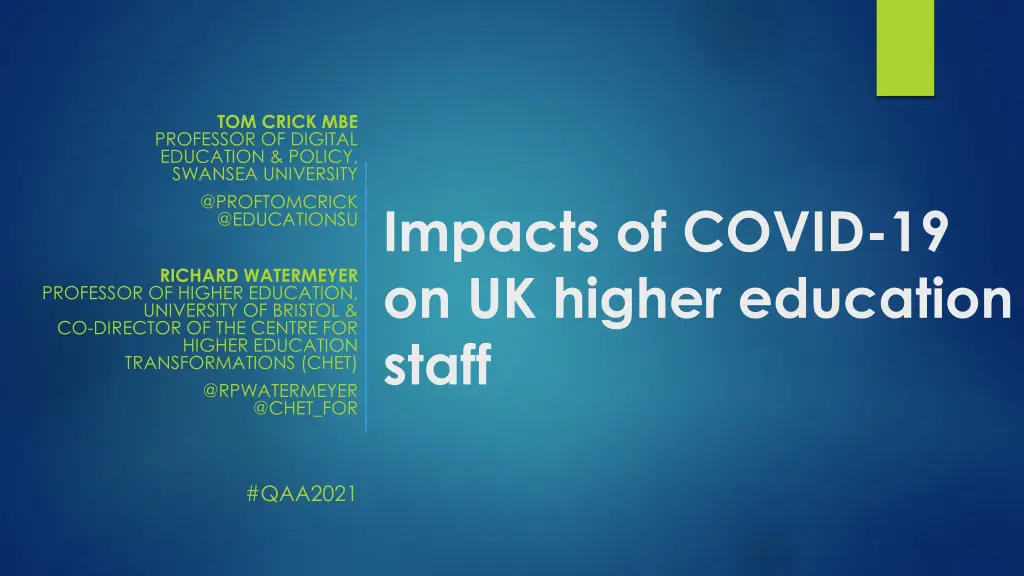
Impacts of COVID-19 on UK Higher Education Staff: Insights from Academic Studies
"Explore the impacts of COVID-19 on UK higher education staff through detailed empirical studies and surveys of over 7000 educators. Gain insights into the challenges faced by academic staff transitioning to remote working, as well as their perspectives on online learning and teaching. Discover respondent profiles and disciplinary affiliations across various fields within the UK higher education sector."
Download Presentation

Please find below an Image/Link to download the presentation.
The content on the website is provided AS IS for your information and personal use only. It may not be sold, licensed, or shared on other websites without obtaining consent from the author. If you encounter any issues during the download, it is possible that the publisher has removed the file from their server.
You are allowed to download the files provided on this website for personal or commercial use, subject to the condition that they are used lawfully. All files are the property of their respective owners.
The content on the website is provided AS IS for your information and personal use only. It may not be sold, licensed, or shared on other websites without obtaining consent from the author.
E N D
Presentation Transcript
TOM CRICK MBE PROFESSOR OF DIGITAL EDUCATION & POLICY, SWANSEA UNIVERSITY @PROFTOMCRICK @EDUCATIONSU Impacts of COVID-19 on UK higher education staff RICHARD WATERMEYER PROFESSOR OF HIGHER EDUCATION, UNIVERSITY OF BRISTOL & CO-DIRECTOR OF THE CENTRE FOR HIGHER EDUCATION TRANSFORMATIONS (CHET) @RPWATERMEYER @CHET_FOR #QAA2021
Drawing on data from 3 major empirical studies over the last 12 months, consulting +7000 UK HE workers
Academic staff: Immediate perspectives on transitioning to remote working
OVERVIEW RESPONDENTS England Scotland Wales Northern Ireland Online attitudinal survey of educators (worldwide/across sectors), generating almost N=3000 responses Distributed through professional networks N=1,148 responses academics working in UK universities: England n=907; Wales n=110; Scotland n=104; Northern Ireland N=25 Respondents representing all disciplinary fields & career hierarchy Gender split: 58% female, 39% male, 1% prefer to self-describe, 2% prefer not to say Employment status: Northern Ireland 2% Wales 9% Scotland 10% 79% Full-Time England 79% 83% Open-Ended Contracts
Respondent Profiles Disciplinary Affiliation POSITION Lectuer (Assistant Professor) Senior Lecturer/Reader (Associate Professor) Professor Graduate Teaching Assistant / Fellow Teaching Fellow Academic Related Education 133 Creative arts and design 67 Historical and philosophical studies 65 Languages 55 Mass communications and documentation 14 Business and administrative studies 99 Law 33 5% Social science 155 6% Architecture, building and planning 12 3% 26% Engineering and technology 46 Computer science 119 15% Mathematical sciences 29 Physical sciences 40 Agriculture and related subjects 1 Veterinary sciences 3 Biological sciences 39 Subjects allied to medicine 53 Medicine and dentistry 10 45% 0 20 40 60 80 100 120 140 160 180
Headline findings 0% 10% 20% 30% 40% 50% 60% 70% 80% 90% 100% "I feel prepared to deliver online learning, teaching and assessment" 49.5% 50.5% "I feel confident in my ability to facilitate online learning, teaching and assessment" 60.6% 39.4% "My institution has been supportive in facilitating the move to online learning, teaching and assessment" 72.7% 27.3% "I can access appropriate technologies to support my online learning, teaching and assessment" 81.7% 18.3% Strongly Agree or Agree Disagree or Strongly Disagree
PREPAREDNESS, CONFIDENCE, SUPPORT AND ACCESS BY DISCIPLINE Preparedness Confidence Support Access 68 74 87 EDUCATION 26 30 25 41 CREATIVE ARTS & DESIGN 22 25 35 41 HISTORICAL & PHILOSOPHICAL STUDIES 14 19 22 31 LANGUAGES 35 44 49 55 BUSINESS & ADMINISTRATIVE STUDIES 16 17 19 22 LAW 52 57 75 98 SOCIAL SCIENCE 20 22 25 30 ENGINEERING & TECHNOLOGY 66 72 82 95 COMPUTER SCIENCE 11 13 15 17 MATHEMATICAL SCIENCES 19 21 23 26 PHYSICAL SCIENCES 10 15 23 26 BIOLOGICAL SCIENCES 23 24 23 34 SUBJECTS ALLIED TO MEDICINE
PREPAREDNESS, CONFIDENCE, SUPPORT and ACCESS by POSITION Academic Related Teaching Fellow Graduate Teaching Assistant/Fellow Professor Senior Lecturer/Reader (Associate Professor) Lecturer (Assistant Professor) 0% 10% 20% 30% 40% 50% 60% 70% 80% 90% 100% Preparedness Confidence Support Access
Themes from open-text responses destabilisation of student marketplace issues of recruitment and retention; threat from private HE providers and edtech sector economic impact not only in terms of decreased revenue from tuition fees but other university services and by extension to local economies/national GDP deprofessionalisation, dumbing-down precarization, jobs obsolescence, job cuts work intensification, gender inequality cessation of research impact on academic labour market limited identification with digital affordances
Academic staff: impact on welfare, health and wellbeing
Pandemia Overview International survey of n=2649 academics; n=1099 UK (65% female; 61% open- ended contracts; 66% from research intensive universities Key themes Crisis-management = creep of undemocratic forms of institutional governance; cost-cutting (disaster management); deprioritisation of research Impaired trust in university leadership Increase in labour casualization; job insecurity Rise in work exploitation and work-based inequalities Key stats 84%: corporate response of universities has contributed to work related stress 85%: suffering from digital fatigue 77%: feeling demotivated 81%: major damage to the job prospects of ECRs 92%: changes to academics working lives as a consequence of institutional responses to COVID-19 have resulted in long-lasting impacts to health and wellbeing
Professional service staff: work experiences under COVID-19
Sample Branch of professional services 25.00% Number of completed surveys: n=4801 20.00% 19.20% Gender Male Female 71% Prefer to self-describe 1% 16.70% 15.00% 28% 15.20% 12.10% 11.80% 10.00% 8.40% Employment status Part-time Full-time 5.00% 22% 78% 5.40% 5.40% 4.30% 3.50% 3.00% 2.30%2.50% 2.00% 0.90% 2.00% 0.00% Type of institution Pre-1992 Post-1992 Not sure 64% 28% 8%
How has working from home affected your ability to do your job? 60.00% 52.20% 50.00% 40.00% 25.40% 22.40% 30.00% 20.00% 10.00% Impact on work ability and work productivity 0.00% Working from home has enhanced my ability to do my job Working from home has made no difference to my ability to do my job Working from home has reduced my ability to do my job How has working from home affected your productivity ? 46.60% 50.00% 35.00% 40.00% 30.00% 18.40% 20.00% 10.00% 0.00% Working from home has made me more productive Working from home has had no impact on my productivity Working from home has made me less productive
How have changes in your work due to the COVID-19 pandemic impacted on your mental and physical health? Impact on mental and physical health and wellbeing 60.00% 54.80% 50.10% 50.00% 40.00% 30.00% 25.90% 24.70% 24.10% 20.50% 20.00% 10.00% 0.00% Positive impact No impact Negative impact Mental Health Physical Health
64% of respondents rate their university s senior leadership through the pandemic as: COMPETENT How would you rate the competency of your university s senior leadership through the pandemic? (e.g. Vice Chancellor, Pro-Vice Chancellor level) 45.00% 38.70% 40.00% 35.00% 30.00% 25.40% 25.00% 20.00% 17.00% 15.00% 12.90% 10.00% 6.10% 5.00% 0.00% Extremely competent Somewhat competent Neither competent nor incompetent Somewhat incompetent Extremely incompetent
IN THE FUTURE WHAT WOULD BE YOUR PREFERRED MODE OF WORK? Exclusively home-based Blended Exclusively campus-based Other A move away from campuses? 3% 15% 11% 71%
Thank you/diolch yn fawr! Watermeyer, R., Shankar, K., Crick, T., Knight, C., McGaughey, F., Hardman, J., Suri, V.R., Chung, R. and Phelan, D. (2021) Pandemia : A reckoning of UK universities corporate response to COVID-19 and its academic fallout. British Journal of Sociology of Education (forthcoming) Watermeyer, R., Crick, T., Knight, C., and Goodall, J. (2020) COVID-19 and digital disruption in uk universities: afflictions and affordances of emergency online migration. Higher Education, 81, 623-641 https://doi.org/10.1007/s10734-020-00561-y Watermeyer, R., Crick, T., Knight, C., and Goodall, J. (2020) forced shift to online teaching in coronavirus pandemic unleashes educators deepest job fears. Nature Index. available from: https://www.natureindex.com/news-blog/forced-shift-to-online-teaching-in- coronavirus-pandemic-unleashes-educators-deepest-job-fears- Watermeyer, R., Crick, T., Knight, C., and Goodall, J. (2020) academic lives are in transition. Wonkhe. Available from: https://wonkhe.com/blogs/academic-lives-are-in-transition/ We would like to acknowledge the contribution of our wider team of researchers including: Dr Cathryn Knight and Dr Janet Goodall (Swansea University); Professor Kalpana Shankar (UCD); Dr Fiona McGaughey (University of Western Australia); Dr Joanna Hardman (University of Cape Town); Dr Venkata Ratnadeep Suri (Indraprastha Institute of Information Technology); Dr Roger Chung (Chinese University of Hong Kong); Dr Dean Phelan (Maynooth University) and Margarida Borras Batalla (University of Bristol) in addition to funding provided by the Worldwide Universities Network (WUN) CONTACT thomas.crick@swansea.ac.uk richard.watermeyer@bristol.ac.uk #QAA2021


